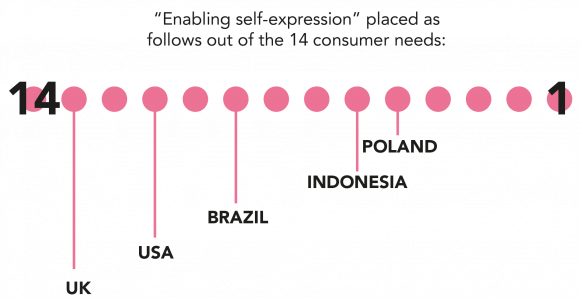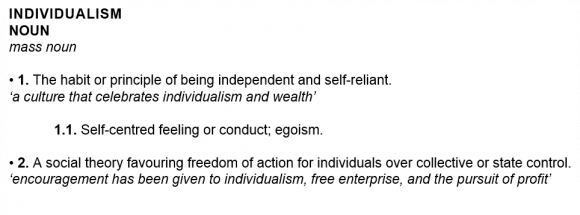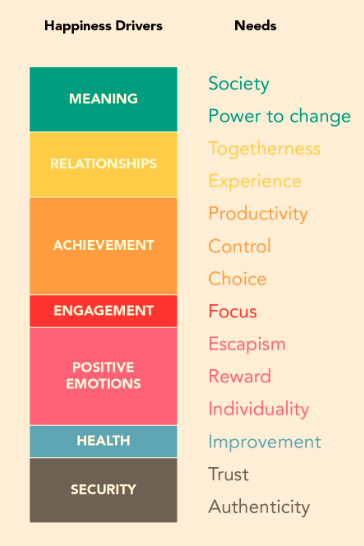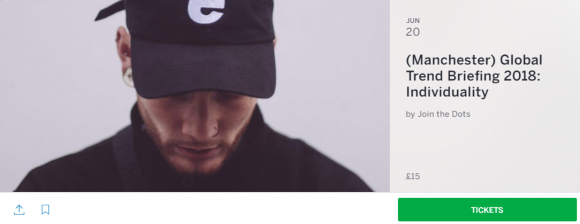Working in Culture & Trends, we spend a great deal of our time interviewing our Illume Guides in local markets around the world to gain cultural insights. Over the past 12 months, these interviews have lead us to notice an important global trend. We found that, no matter the culture being explored or the topic being investigated, be it beauty in Brazil or snacking in China, our guides expressed an increasing desire to establish themselves as an ‘individual’. To carve out their own unique identity, follow their dreams and be different. This trend is particularly strong amongst younger generations and is prevalent across the globe.
Fascinated by the scale of our discovery, we began a project looking into how individuality is being expressed in different cultures. Now, for the first time, we’re writing about the results…
A GLOBAL MEGA TREND
The trend we identified has been the subject of study by psychologists Santos and Grossman. Their research looks across 78 markets and 51 years’ worth of data spanning multiple studies – ranging from baby names and household size, through to understanding how far people prioritise self-expression as a national goal, showing that most countries are moving towards greater individualism and have been doing so for decades. (1)
Whilst this has been happening for years, interestingly, the force in which individualism is now being adopted is important. Not only are developing countries becoming more open and embracing of it, but traditionally individualist markets like the US or the UK are becoming even more so as household incomes increase. Individualism in the United States for example, already one of the most individualistic societies in the world – valuing liberty, freedom of speech and independence – has been rising over the last 150 years.
This shift towards greater individuality has implications for all brands who, at their core, exist to help their consumers express their own identity, and this growth rate means it cannot be overlooked.
VALUED DIFFERENTLY IN LOCAL MARKETS
From existing research we could see this trend is growing strongly across the globe, however, we wanted to understand how it differs depending on the market, and its impact on the products and services people buy to express themselves and their individuality.
We chose the following markets for our study: UK, USA, Poland, Brazil and Indonesia. These represent different levels of individualism vs collectivism as measured via Hofstede’s 6 Cultural Dimensions model.
Respondents were provided with a list of statements, each one relating to our 14 universal consumer needs which are all aligned to our drivers of happiness, as below.
We asked them to choose the needs most important to them when choosing brands, products and services.
“Enabling self-expression” placed as follows out of the 14 consumer needs:

Consumers in each market placed ‘individuality’ differently in their hierarchy – suggesting that each market values it differently when making a purchase. Interestingly, the more emerging and traditionally collectivist cultures of Indonesia and Brazil ranked self-expression as being far more important than consumers in the established and traditionally highly individualistic markets of the UK and USA. Poland, an individualistic market with a history of communism, places self-expression the highest of the five markets surveyed.
CREATING CULTURALLY UNIQUE OPPORTUNITIES
After the survey, we reached out to Illume Guides from each of our chosen countries. From here, we were able to gain their unique perspectives on individuality in their country. This allowed us to layer on cultural context and make more sense of the data which on the face seemed counter intuitive.
Perhaps unsurprisingly, we found the UK and USA to be two of the most individualistic nations in the world. Individuality and self-expression is deeply engrained here. This can be rooted back to cultural history – from a culture of celebrating difference and eccentricities in the UK, through to the pioneering spirit and value of the underdog to make it on top in the USA – doing your own thing in both countries is a guiding principle.
Self-expression via consumption is so normalised that it is simply expected from brands. In the UK the emerging challenge is how to be more different than the next person, the role for brands is maintaining the edge on individual difference. This beautifully encapsulated by our guide Rosie.
“You have to portray yourself in an individualistic way, but in such a way that it is part of a fashion that is accepted and thought of to be in the trend. There’s a constant dilemma in people’s mind as to how they portray themselves” Rosie, UK
The data showed individuality wasn’t valued as much in these countries as others, but this is because expressing oneself is so normalised it has a lower priority.
In contrast, Poland is a country where individuality is valued highly but is rarely outwardly displayed, explaining why Poland tops our survey as the country most valuing of self-expression – because there’s a higher need for it. However, the cultural nuance of Poland means there is a strong desire amongst young people to be more individual – but they retain cultural reserve when it comes to standing out. The need here is for brands to find ways of making young people feel individual without outwardly displaying individuality, or as our guide Alex put it:
“Every person is unique, has something which just differs from others, and not every person wants to show it to others, it’s more about how you act. When a person just cares about the outside look it shows me what I can expect from the person” Alex
In the traditionally collective markets of Indonesia and Brazil, the focus is on maintaining the balance between the individual and the collective. Brazil, for example, is a market with very standardized ideas around appearance. Individuality is on the rise, but it is within a very defined frame of reference. In Brazil the opportunity is for brands to support individual interpretation of the standard ideal.
“Brazilian people care a lot about the opinion of others, especially when it comes to appearance. You need to look to a certain standard to be taken seriously. I think it is better to take into account of these standards. It is good to be accepted by others” Pedro
Individualism is on the rise globally and this is informing consumer decision making when it comes to self-expression but the opportunity for brands is very different in each local markets. Our study demonstrates the value of putting cultural context back into international research projects and the need for a more consumer centric way of understanding cultural difference, beyond Hofstede.
We are going to be presenting our trend report with full findings, as well as exploring the implications for global brands in more detail in Manchester on the 20th June 2018. Click here find out more about the event and book your place.
- Individualistic practices and values increasing around the world, Psychological Science, 17 July 2017, Henri C. Santos and Igor Grossmann





[…] For more information on the culture and trends behind individuality, download more insights from Join The Dot’s Individuality Report here. […]